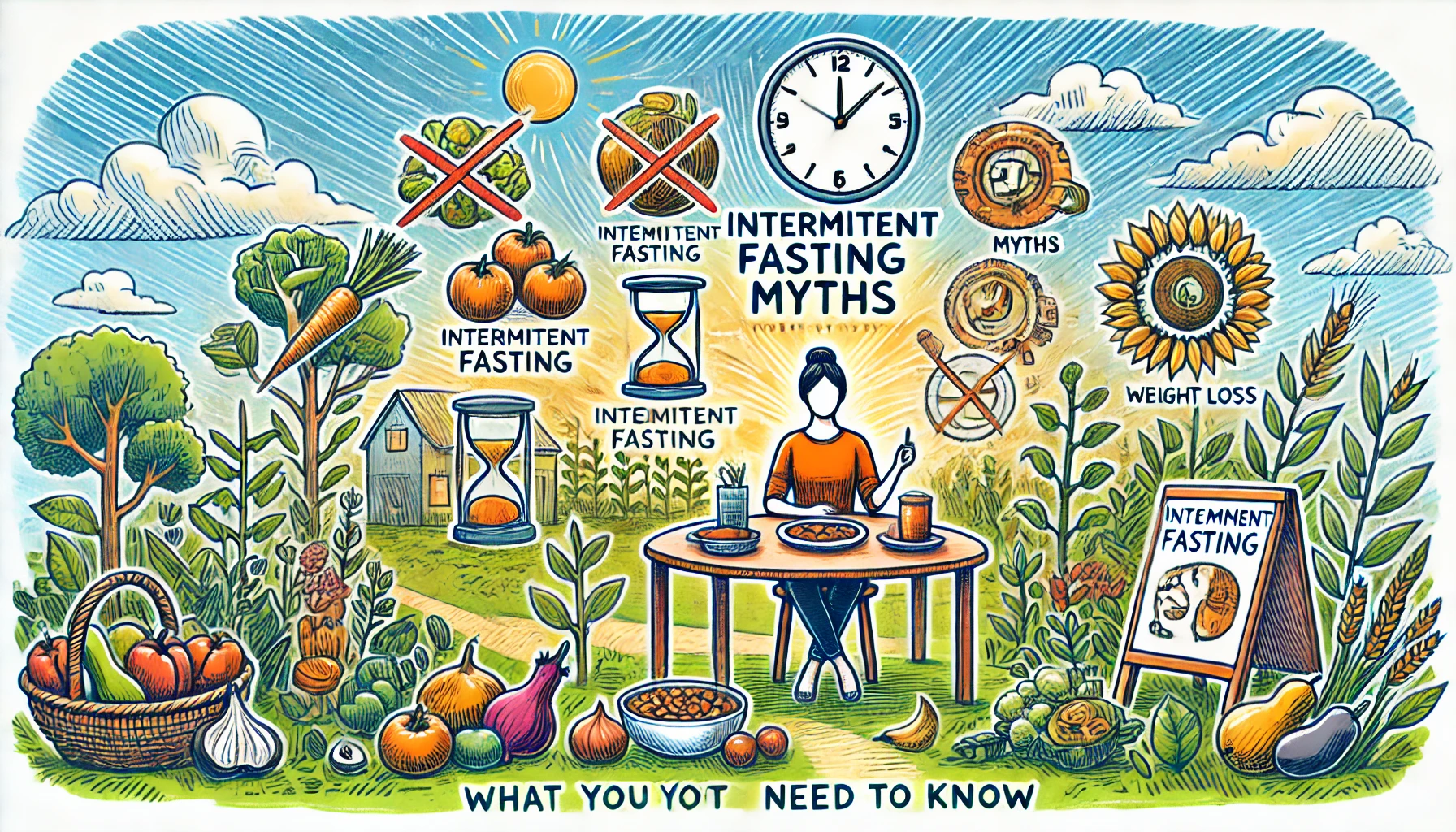Intermittent fasting (IF) has gained widespread popularity for its potential benefits in weight loss, metabolic health, and overall well-being. However, with its rise in popularity, several myths and misconceptions have emerged. These myths can create confusion and may even deter people from trying intermittent fasting or prevent them from reaping its full benefits. Understanding the truth behind these myths is crucial for anyone considering intermittent fasting as a dietary approach. This article aims to debunk common myths about intermittent fasting and provide accurate information to help you make informed decisions.
Intermittent fasting involves cycling between periods of eating and fasting, with various methods available to suit different lifestyles. While it may seem straightforward, misconceptions often arise due to misunderstandings about its effects on metabolism, muscle mass, and overall health. Let’s explore some of the most prevalent myths about intermittent fasting and clarify the facts.
1. Myth: Intermittent Fasting Slows Down Your Metabolism
- The Truth: One of the most common myths is that intermittent fasting slows down metabolism. However, short-term fasting can actually increase metabolic rate by boosting norepinephrine levels, a hormone that promotes fat burning. Studies have shown that fasting for short periods, such as 24 hours or less, can temporarily increase metabolic rate. However, prolonged fasting or extreme caloric restriction may lead to a decrease in metabolism as the body adapts to conserve energy.
2. Myth: Intermittent Fasting Causes Muscle Loss
- The Truth: Another prevalent myth is that intermittent fasting leads to muscle loss. While extended fasting without adequate nutrition can result in muscle catabolism, intermittent fasting, especially when combined with resistance training and adequate protein intake, can help preserve muscle mass. During fasting periods, the body primarily uses stored fat for energy, and growth hormone levels increase, which helps protect muscle tissue.
3. Myth: You Can Eat Whatever You Want During Eating Windows
- The Truth: Some people mistakenly believe that intermittent fasting allows them to eat anything and everything during their eating windows. While IF does not dictate specific foods, the quality of your diet still matters. Consuming nutrient-dense foods and balanced meals is essential for achieving the full benefits of intermittent fasting, such as improved metabolic health and weight management. Overeating or consuming unhealthy foods during eating windows can negate the benefits of fasting.
4. Myth: Intermittent Fasting Is Only for Weight Loss
- The Truth: While weight loss is a common motivation for many people who practice intermittent fasting, it offers a range of other health benefits. These include improved insulin sensitivity, reduced inflammation, enhanced brain function, and better cardiovascular health. Intermittent fasting can be part of a holistic approach to overall well-being, not just a weight loss strategy.
5. Myth: Fasting Puts Your Body in Starvation Mode
- The Truth: Starvation mode refers to a severe reduction in metabolic rate in response to prolonged food deprivation. Short-term intermittent fasting does not lead to starvation mode. The body typically switches to using stored fat for energy during fasting periods, which can actually enhance fat burning. Starvation mode is more associated with chronic severe caloric restriction over extended periods, not the controlled fasting periods seen in IF.
6. Myth: You Need to Fast Every Day for It to Be Effective
- The Truth: Intermittent fasting does not require daily fasting to be effective. There are various IF methods, such as the 5:2 diet, Eat-Stop-Eat, and alternate-day fasting, which do not involve daily fasting. The effectiveness of intermittent fasting can depend on individual goals, preferences, and lifestyle. Even fasting a few times a week can provide health benefits and aid in weight management.
7. Myth: Fasting Will Make You Feel Constantly Hungry
- The Truth: While it’s common to experience hunger during the initial adjustment period of intermittent fasting, many people find that their hunger levels stabilize over time. The body adapts to the new eating schedule, and hunger hormones like ghrelin adjust accordingly. Staying hydrated, consuming nutrient-dense foods, and maintaining a consistent fasting schedule can help manage hunger.
8. Myth: Intermittent Fasting Is Unsafe for Everyone
- The Truth: Intermittent fasting can be a safe and beneficial practice for many people. However, it may not be suitable for everyone, particularly individuals with certain medical conditions, pregnant or breastfeeding women, children, and those with a history of eating disorders. It’s essential to consult a healthcare professional before starting intermittent fasting, especially if you have underlying health concerns.
9. Myth: You Can’t Exercise While Fasting
- The Truth: Exercising during fasting periods is possible and can even enhance the benefits of intermittent fasting, such as improved fat burning and increased insulin sensitivity. However, the intensity and type of exercise may need to be adjusted based on individual tolerance and energy levels. Some people prefer to work out during their eating window or immediately after breaking their fast, while others find fasted workouts beneficial.
10. Myth: Intermittent Fasting Will Lead to Nutrient Deficiencies
- The Truth: Intermittent fasting does not inherently lead to nutrient deficiencies. However, it is crucial to consume a balanced diet rich in essential nutrients during eating windows. Focusing on whole, nutrient-dense foods, including lean proteins, healthy fats, fruits, vegetables, and whole grains, can help meet nutritional needs. If you have specific dietary concerns, consider consulting a nutritionist or dietitian.
Intermittent fasting is a versatile and effective dietary approach with numerous benefits beyond weight loss, including improved metabolic health, reduced inflammation, and enhanced cognitive function. However, several myths and misconceptions about intermittent fasting can lead to confusion and misinformation. By understanding the facts and dispelling these myths, you can make informed decisions about whether intermittent fasting is right for you. As with any dietary change, it’s essential to listen to your body, prioritize balanced nutrition, and consult with healthcare professionals if you have any concerns. With the right approach, intermittent fasting can be a sustainable and beneficial practice for achieving overall health and wellness.

